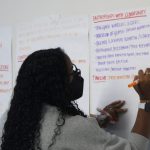The Supreme Court case that declared school segregation unconstitutional, and cost America a lot of qualified Black teachers and educators. Basically, integration was not a two-way street. Black students were bused and integrated into white schools while their teachers and principals were not. They, and their educational institutions, were assumed to be inferior even though many Black educators were more highly qualified than their white counterparts in the days of Brown v Board.
Jim Crow’s Pink Slip: The Untold Story of Black Principal and Teacher Leadership by Leslie T. Fenwick
The effects of not protecting and valuing Black educators and administrators are still felt to this day. Which brings us back to Jennifer Guiffre. She tells her students “I’m an activist first and then a teacher” following in the footsteps of generations of Black educators. Where she could not find examples of Black educators in her own life, she tells of being inspired by the past (which is her focus as a history teacher) and the words of Fredrick Douglass.
